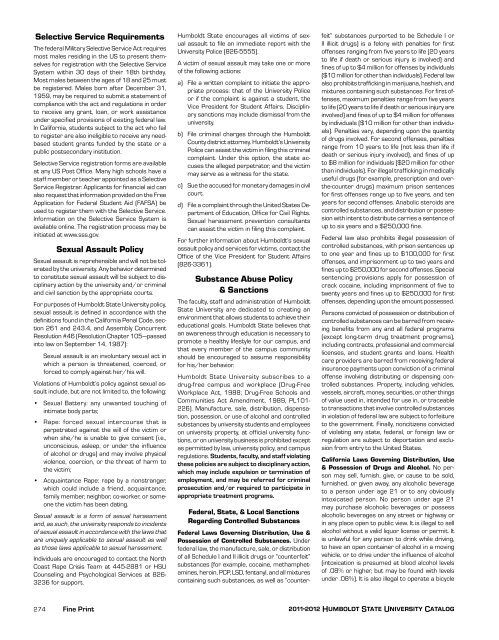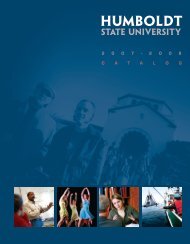2011-12 Academic Year - Bad Request - Humboldt State University
2011-12 Academic Year - Bad Request - Humboldt State University
2011-12 Academic Year - Bad Request - Humboldt State University
Create successful ePaper yourself
Turn your PDF publications into a flip-book with our unique Google optimized e-Paper software.
Selective Service Requirements<br />
The federal Military Selective Service Act requires<br />
most males residing in the US to pre sent themselves<br />
for registration with the Selective Service<br />
System within 30 days of their 18th birthday.<br />
Most males between the ages of 18 and 25 must<br />
be registered. Males born after December 31,<br />
1959, may be required to submit a statement of<br />
compliance with the act and regulations in order<br />
to receive any grant, loan, or work assistance<br />
under specified provisions of existing federal law.<br />
In California, students subject to the act who fail<br />
to register are also in eligible to receive any needbased<br />
student grants funded by the state or a<br />
public post sec ondary institution.<br />
Selective Service registration forms are available<br />
at any US Post Office. Many high schools have a<br />
staff member or teacher appointed as a Selective<br />
Service Registrar. Applicants for financial aid can<br />
also request that information provided on the Free<br />
Application for Federal Student Aid (FAFSA) be<br />
used to register them with the Selective Service.<br />
Information on the Selective Service System is<br />
available online. The registration process may be<br />
initiated at www.sss.gov.<br />
Sexual Assault Policy<br />
Sexual assault is reprehensible and will not be tolerated<br />
by the university. Any behavior determined<br />
to constitute sexual assault will be subject to discipli<br />
nary action by the university and/or criminal<br />
and civil sanction by the appropriate courts.<br />
For purposes of <strong>Humboldt</strong> <strong>State</strong> <strong>University</strong> policy,<br />
sexual assault is defined in accordance with the<br />
definitions found in the California Penal Code, section<br />
261 and 243.4, and Assem bly Concurrent<br />
Resolution #46 (Resolution Chapter 105—passed<br />
into law on September 14, 1987):<br />
Sexual assault is an involuntary sexual act in<br />
which a person is threatened, coerced, or<br />
forced to comply against her/his will.<br />
Violations of <strong>Humboldt</strong>’s policy against sex ual assault<br />
include, but are not limited to, the following:<br />
• Sexual Battery: any unwanted touching of<br />
intimate body parts;<br />
• Rape: forced sexual intercourse that is<br />
perpetrated against the will of the victim or<br />
when she/he is unable to give consent (i.e.,<br />
unconscious, asleep, or under the influence<br />
of alcohol or drugs) and may involve physical<br />
violence, coercion, or the threat of harm to<br />
the victim;<br />
• Acquaintance Rape: rape by a nonstranger,<br />
which could include a friend, acquaintance,<br />
family member, neighbor, co-worker, or someone<br />
the victim has been dating.<br />
Sexual assault is a form of sexual harassment<br />
and, as such, the university responds to incidents<br />
of sex ual assault in accordance with the laws that<br />
are uniquely applicable to sexual assault as well<br />
as those laws applicable to sexual harassment.<br />
In di vid uals are encouraged to contact the North<br />
Coast Rape Crisis Team at 445-2881 or HSU<br />
Counseling and Psychological Services at 826-<br />
3236 for support.<br />
<strong>Humboldt</strong> <strong>State</strong> encourages all victims of sexual<br />
as sault to file an immediate report with the<br />
<strong>University</strong> Police (826-5555).<br />
A victim of sexual assault may take one or more<br />
of the following actions:<br />
a) File a written complaint to initiate the ap propriate<br />
proc ess: that of the <strong>University</strong> Police<br />
or if the complaint is against a student, the<br />
Vice President for Student Affairs. Disciplinary<br />
sanctions may include dismissal from the<br />
university.<br />
b) File criminal charges through the <strong>Humboldt</strong><br />
County district attorney. <strong>Humboldt</strong>’s <strong>University</strong><br />
Police can assist the victim in filing this criminal<br />
complaint. Under this option, the state accuses<br />
the alleged perpetrator, and the victim<br />
may serve as a witness for the state.<br />
c) Sue the accused for monetary damages in civil<br />
court.<br />
d) File a complaint through the United <strong>State</strong>s Department<br />
of Education, Office for Civil Rights.<br />
Sexual harassment prevention con sultants<br />
can assist the victim in filing this complaint.<br />
For further information about <strong>Humboldt</strong>’s sexual<br />
assault policy and services for victims, con tact the<br />
Office of the Vice Presi dent for Student Affairs<br />
(826-3361).<br />
Substance Abuse Policy<br />
& Sanctions<br />
The faculty, staff and administration of <strong>Humboldt</strong><br />
<strong>State</strong> <strong>University</strong> are dedicated to creating an<br />
environment that allows students to achieve their<br />
edu cational goals. <strong>Humboldt</strong> <strong>State</strong> believes that<br />
an awareness through education is necessary to<br />
promote a healthy lifestyle for our campus, and<br />
that every member of the campus community<br />
should be encouraged to assume responsibility<br />
for his/her behavior.<br />
<strong>Humboldt</strong> <strong>State</strong> <strong>University</strong> subscribes to a<br />
drug-free campus and workplace (Drug-Free<br />
Workplace Act, 1988; Drug-Free Schools and<br />
Communities Act Amendment, 1989, PL101-<br />
226). Manufacture, sale, distribution, dispen sation,<br />
possession, or use of alcohol and controlled<br />
substances by university students and employees<br />
on university proper ty, at official university functions,<br />
or on university business is prohibited except<br />
as permitted by law, university policy, and campus<br />
regulations. Students, faculty, and staff violating<br />
these policies are subject to disciplinary action,<br />
which may include expulsion or termination of<br />
employment, and may be referred for criminal<br />
prosecution and/or required to participate in<br />
appropriate treatment programs.<br />
Federal, <strong>State</strong>, & Local Sanctions<br />
Regarding Controlled Substances<br />
Federal Laws Governing Distribution, Use &<br />
Possession of Controlled Substances. Under<br />
federal law, the manufacture, sale, or distribution<br />
of all Schedule I and II illicit drugs or “counterfeit”<br />
substances (for example, cocaine, methamphetamines,<br />
heroin, PCP, LSD, fentanyl, and all mixtures<br />
containing such sub stances, as well as “counter-<br />
feit” substances purported to be Schedule I or<br />
II illicit drugs) is a felony with penalties for first<br />
offenses ranging from five years to life (20 years<br />
to life if death or serious injury is involved) and<br />
fines of up to $4 million for offenses by individ uals<br />
($10 million for other than individuals). Federal law<br />
also prohibits trafficking in marijuana, hashish, and<br />
mixtures containing such substances. For first offenses,<br />
maximum penalties range from five years<br />
to life (20 years to life if death or serious injury are<br />
involved) and fines of up to $4 million for offenses<br />
by individuals ($10 million for other than individuals).<br />
Pen al ties vary, depending upon the quantity<br />
of drugs involved. For second offenses, penalties<br />
range from 10 years to life (not less than life if<br />
death or serious injury involved), and fines of up<br />
to $8 million for individuals ($20 million for other<br />
than individuals). For illegal trafficking in medically<br />
useful drugs (for example, prescription and overthe-counter<br />
drugs) maximum prison sentences<br />
for first offenses range up to five years, and ten<br />
years for second offenses. Anabolic ster oids are<br />
controlled substances, and distribution or possession<br />
with intent to distribute carries a sentence of<br />
up to six years and a $250,000 fine.<br />
Federal law also prohibits illegal possession of<br />
controlled substances, with prison sentences up<br />
to one year and fines up to $100,000 for first<br />
offenses, and imprisonment up to two years and<br />
fines up to $250,000 for second offenses. Special<br />
sentencing provisions apply for possession of<br />
crack cocaine, including imprisonment of five to<br />
twenty years and fines up to $250,000 for first<br />
offenses, depending upon the amount possessed.<br />
Persons convicted of possession or distribution of<br />
controlled substances can be barred from receiving<br />
benefits from any and all federal programs<br />
(except long-term drug treatment programs),<br />
including contracts, professional and commercial<br />
licenses, and student grants and loans. Health<br />
care providers are barred from receiving federal<br />
insurance payments upon conviction of a criminal<br />
offense involving distributing or dispensing controlled<br />
substances. Property, including vehicles,<br />
vessels, aircraft, money, securities, or other things<br />
of value used in, intended for use in, or traceable<br />
to transactions that involve controlled sub stances<br />
in violation of federal law are subject to forfeiture<br />
to the government. Finally, noncitizens convicted<br />
of violating any state, federal, or foreign law or<br />
regulation are subject to deportation and exclusion<br />
from entry to the United <strong>State</strong>s.<br />
California Laws Governing Distribution, Use<br />
& Possession of Drugs and Alcohol. No person<br />
may sell, furnish, give, or cause to be sold,<br />
furnished, or given away, any alcoholic beverage<br />
to a person under age 21 or to any obviously<br />
intoxicated person. No person under age 21<br />
may purchase alcoholic beverages or possess<br />
alcoholic beverages on any street or highway or<br />
in any place open to public view. It is illegal to sell<br />
alcohol without a valid liquor license or permit. It<br />
is unlawful for any person to drink while driving,<br />
to have an open container of alcohol in a moving<br />
vehicle, or to drive under the influence of alcohol<br />
(intoxication is presumed at blood alcohol levels<br />
of .08% or higher, but may be found with levels<br />
under .08%). It is also illegal to operate a bicycle<br />
274 Fine Print<br />
<strong>2011</strong>-20<strong>12</strong> <strong>Humboldt</strong> <strong>State</strong> <strong>University</strong> Catalog

















